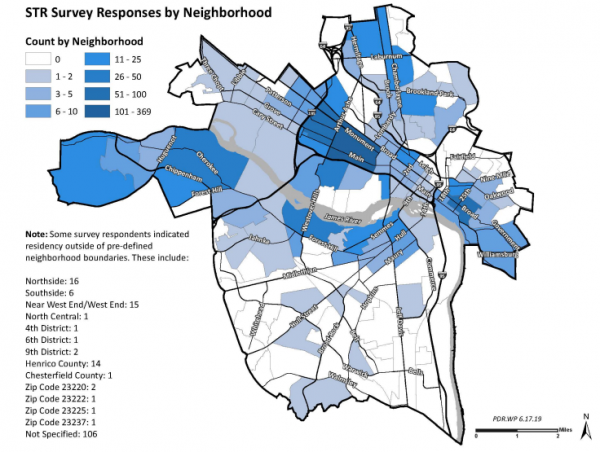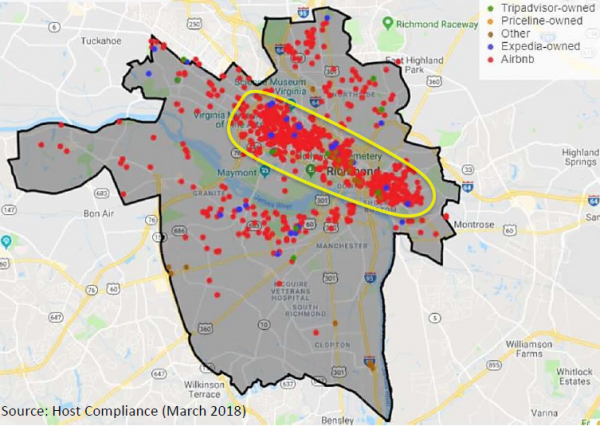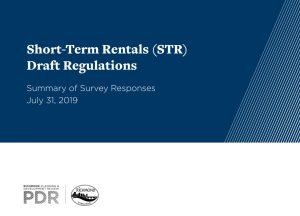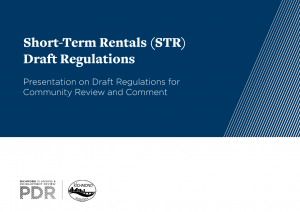
The above map shows survey respondents broken down per neighborhood. (Richmond Planning & Neighborhood Review)
As proposed rules for short-term residential rentals head to Richmond City Council later this year, a clearer picture of public sentiment on the issue is being gleaned from survey results that could end up being used to reshape the regulations.
The city recently posted the results of an online and paper survey conducted over two months this spring that gauged opinions on different aspects of the proposed rules, which city planners have said are intended to allow short-term room and home rentals on sites like Airbnb that currently are illegal according to city code.
Feedback from the survey, as well as from a series of public meetings held earlier this year, could influence the final proposals presented later this year to the Planning Commission and council, which would need to sign off on any changes to zoning or taxation rules.
A summary of the results posted along with the roughly 1,200 responses received show general support for some of the proposals, while others received mixed reviews or clear thumbs down.
Mixed results
Receiving the most disagreement from respondents was a proposed limit of 180 nights per year that a property could be rented out short term, meaning for less than 30 days at a time. The limit was among several sticking points for attendees at a public meeting in May who described such restrictions as arbitrarily set and not based on actual data.
According to the survey results, 36 percent of respondents said there should be no limit on the number of nights, while 10 percent said more nights should be allowed. Sixteen percent said fewer nights should be allowed, while 15 percent agreed with 180. Remaining respondents were either neutral or gave no response.
A question on whether both property owners and tenants of a residential unit should be allowed to operate the unit as a rental also produced a mixed bag of responses. The proposal would require tenants to secure property owner approval, and condos and co-ops would require association board approval. Operators also would need to prove primary residency by residing at the property at least 185 days a year.
Forty percent of respondents liked that proposal, while 35 percent disagreed, with 230 of those respondents saying that primary residency should not be required. Forty-nine respondents who disagreed said tenants should not be allowed to operate rentals.
Mixed results also came from a question on whether to limit the number of rentable units in a multifamily or mixed-use building to nine units or 25 percent of the total number of units, whichever is less. Thirty-one percent agreed, 29 percent disagreed and 25 percent said they were neutral. Eighty responses called for no limit, while 43 said fewer units should be permitted.
Under the proposed rules, rentals with four or more bedrooms would be subject to the city’s 8 percent transient occupancy tax. Business licenses and business personal property taxes related to short-term rentals, or STRs, would not apply to the rules. Operators would be required to obtain a biennial permit at a cost of $300.
Survey questions that drew the most agreement included: permitting STRs as an accessory use in any zoning district that permits residential uses; allowing STRs in all types of dwellings, including accessory dwellings; and limiting the number of adult lodgers to two per sleeping room, with no more than five sleeping rooms per rental.
Respondents also were largely in favor of not requiring operators to occupy a rental during a stay, not requiring additional parking for STRs, and prohibiting events such as parties, weddings or meetings involving anyone other than the short-term renter.
Neighborhood stats

A map showing short-term rental operations in March of 2018. (Courtesy Richmond Planning & Development Review)
According to the city, in March 2018, Richmond had 835 listings, representing 749 unique rental units primarily concentrated in the Fan and Museum districts, Church Hill and downtown.
As of Wednesday, AirDNA, a short-term rental analytics site, showed 678 active listings in Richmond, with a 71 percent occupancy rate and an average daily rate of $127, or $2,346 for the month of July, inclusive of cleaning fees.
Nearly 450 of those were homes, while 226 were private rooms and five were shared rooms. Ninety percent were listed on Airbnb, while 3 percent were on HomeAway and 7 percent were on both platforms.
Most of the survey respondents – 65 percent – said they were aware of STRs operating in their neighborhood, with the majority of those respondents, 577, saying they have no concerns with the use. The rest of those respondents, 225, said they do have concerns.
The highest concentration of responses came from Church Hill, and the Fan and Museum districts, with up to 369 responses from the Fan and 51-100 from each of the other neighborhoods. Other areas with stronger responses (11-50) included Stratford Hills, Union Hill, Jackson Ward, Scott’s Addition, Southampton/Stony Point, Forest Hill/Westover Hills, Manchester/Woodland Heights, Byrd Park/Maymont, and parts of Northside.
Seventy-seven percent of respondents said they were a Richmond homeowner, 21 percent said they owned property in the city, 15 percent said they rented in the city, 10 percent were business owners and 4 percent said they did not reside or own a business or property in the city. Sixty percent said they live in a single-family detached home, 20 percent in a single-family attached home, 18 percent in a multifamily dwelling, and 2 percent did not specify.
Some respondents offered comments citing benefits or concerns about STRs, with those in favor saying they’re better maintained and operated than long-term rentals, they benefit the economy by increasing tourism, they make housing affordable for operators and they provide lodging in parts of the city where options are limited.
Concerns included impacts on housing availability and affordability, changes to the character of residential neighborhoods, disturbances such as noise and trash, less available parking, and absentee or unresponsive landlords.
The full summary of the results can be viewed on the city’s website. A spreadsheet of raw data from the responses and more information about the proposals also can be viewed here.

The above map shows survey respondents broken down per neighborhood. (Richmond Planning & Neighborhood Review)
As proposed rules for short-term residential rentals head to Richmond City Council later this year, a clearer picture of public sentiment on the issue is being gleaned from survey results that could end up being used to reshape the regulations.
The city recently posted the results of an online and paper survey conducted over two months this spring that gauged opinions on different aspects of the proposed rules, which city planners have said are intended to allow short-term room and home rentals on sites like Airbnb that currently are illegal according to city code.
Feedback from the survey, as well as from a series of public meetings held earlier this year, could influence the final proposals presented later this year to the Planning Commission and council, which would need to sign off on any changes to zoning or taxation rules.
A summary of the results posted along with the roughly 1,200 responses received show general support for some of the proposals, while others received mixed reviews or clear thumbs down.
Mixed results
Receiving the most disagreement from respondents was a proposed limit of 180 nights per year that a property could be rented out short term, meaning for less than 30 days at a time. The limit was among several sticking points for attendees at a public meeting in May who described such restrictions as arbitrarily set and not based on actual data.
According to the survey results, 36 percent of respondents said there should be no limit on the number of nights, while 10 percent said more nights should be allowed. Sixteen percent said fewer nights should be allowed, while 15 percent agreed with 180. Remaining respondents were either neutral or gave no response.
A question on whether both property owners and tenants of a residential unit should be allowed to operate the unit as a rental also produced a mixed bag of responses. The proposal would require tenants to secure property owner approval, and condos and co-ops would require association board approval. Operators also would need to prove primary residency by residing at the property at least 185 days a year.
Forty percent of respondents liked that proposal, while 35 percent disagreed, with 230 of those respondents saying that primary residency should not be required. Forty-nine respondents who disagreed said tenants should not be allowed to operate rentals.
Mixed results also came from a question on whether to limit the number of rentable units in a multifamily or mixed-use building to nine units or 25 percent of the total number of units, whichever is less. Thirty-one percent agreed, 29 percent disagreed and 25 percent said they were neutral. Eighty responses called for no limit, while 43 said fewer units should be permitted.
Under the proposed rules, rentals with four or more bedrooms would be subject to the city’s 8 percent transient occupancy tax. Business licenses and business personal property taxes related to short-term rentals, or STRs, would not apply to the rules. Operators would be required to obtain a biennial permit at a cost of $300.
Survey questions that drew the most agreement included: permitting STRs as an accessory use in any zoning district that permits residential uses; allowing STRs in all types of dwellings, including accessory dwellings; and limiting the number of adult lodgers to two per sleeping room, with no more than five sleeping rooms per rental.
Respondents also were largely in favor of not requiring operators to occupy a rental during a stay, not requiring additional parking for STRs, and prohibiting events such as parties, weddings or meetings involving anyone other than the short-term renter.
Neighborhood stats

A map showing short-term rental operations in March of 2018. (Courtesy Richmond Planning & Development Review)
According to the city, in March 2018, Richmond had 835 listings, representing 749 unique rental units primarily concentrated in the Fan and Museum districts, Church Hill and downtown.
As of Wednesday, AirDNA, a short-term rental analytics site, showed 678 active listings in Richmond, with a 71 percent occupancy rate and an average daily rate of $127, or $2,346 for the month of July, inclusive of cleaning fees.
Nearly 450 of those were homes, while 226 were private rooms and five were shared rooms. Ninety percent were listed on Airbnb, while 3 percent were on HomeAway and 7 percent were on both platforms.
Most of the survey respondents – 65 percent – said they were aware of STRs operating in their neighborhood, with the majority of those respondents, 577, saying they have no concerns with the use. The rest of those respondents, 225, said they do have concerns.
The highest concentration of responses came from Church Hill, and the Fan and Museum districts, with up to 369 responses from the Fan and 51-100 from each of the other neighborhoods. Other areas with stronger responses (11-50) included Stratford Hills, Union Hill, Jackson Ward, Scott’s Addition, Southampton/Stony Point, Forest Hill/Westover Hills, Manchester/Woodland Heights, Byrd Park/Maymont, and parts of Northside.
Seventy-seven percent of respondents said they were a Richmond homeowner, 21 percent said they owned property in the city, 15 percent said they rented in the city, 10 percent were business owners and 4 percent said they did not reside or own a business or property in the city. Sixty percent said they live in a single-family detached home, 20 percent in a single-family attached home, 18 percent in a multifamily dwelling, and 2 percent did not specify.
Some respondents offered comments citing benefits or concerns about STRs, with those in favor saying they’re better maintained and operated than long-term rentals, they benefit the economy by increasing tourism, they make housing affordable for operators and they provide lodging in parts of the city where options are limited.
Concerns included impacts on housing availability and affordability, changes to the character of residential neighborhoods, disturbances such as noise and trash, less available parking, and absentee or unresponsive landlords.
The full summary of the results can be viewed on the city’s website. A spreadsheet of raw data from the responses and more information about the proposals also can be viewed here.

